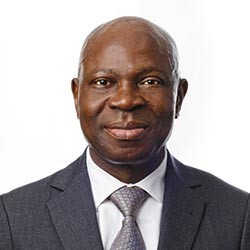African Union – European Union Summit, Agriculture and Sustainable Development Roundtable, Keynote Statement by Gilbert F. Houngbo, President of IFAD
IFAD Asset Request Portlet
ناشر الأصول
الاتحاد الأفريقي - قمة الاتحاد الأوروبي ، بيان رئيسي أدلى به جيلبر هونجبو ، رئيس الصندوق الدولي للتنمية الزراعية
Agriculture and Sustainable Development Roundtable
موقع: Brussels, Belgium
18 فبراير 2022Excellencies,
Respected Colleagues,
Ladies and Gentlemen,
Let me first thank the African Union and the European Union for organizing this Summit, and for inviting me as a keynote speaker in this roundtable.
Agriculture is at the nexus of so many of the Sustainable Development Goals, but it has not yet reached its potential to drive sustainable development in Africa. We all know the challenges, but let me remind a few striking figures:
- Agriculture accounts for 16% of African GDP, and even 27% and 24% in East and West Africa respectively,
- In Africa, two-thirds of population lives in rural areas where 80% of poor are concentrated,
- Every year 10 to 12 million young people enter the African labour market,
- The continent imports around $70 billion in food annually, and this is expected to reach $100 billion by 2025,
- Agriculture accounts for 70% of global freshwater withdrawals,
- Women represent more than 50% of the agricultural work force, but women receive less than 10 per cent of credit granted to smallholder farmers,
- Economic growth in agriculture is two to three times more effective at reducing poverty and food insecurity than growth generated in other sectors.
My point is that in Africa, Agriculture is a huge opportunity, not only for food security and nutrition but also for economic growth, wealth creation, addressing inequalities and social justice, while protecting the environment.
Allow me to highlight a few considerations that are key in tapping into these opportunities:
Technology and innovation for increased productivity.
Technology and innovation can create modern value chains that drive progress, reduce risk, and connect smallholders to markets. Investing in technology can supports decent jobs and the stability of incomes and food production, and makes it more appealing to young people.
For example, mobile phone services already provide real-time weather information and market data; satellites measure soil moisture; solar panels power irrigation systems. This is how small farms can change, adapt and succeed.
The COVID-19 crisis, and today’s rising energy prices, have shown why it’s Essential for Africa to bridge the production gap and reduce the food import bill.
In the pandemic, Africa’s small-scale producers were crucial in maintaining food security and nutrition by supplying local and national markets.
Promotion of plant-based protein is key for nutrition sake as well as for reduction in CO2 emission and nature conservation.
This area is clearly conducive for sustaining the greening effort of the Great Green Wall initiative, as well as a great opportunity to support agribusiness initiative led by African youth and rural SMEs.
IFAD is therefore strongly supportive and highly committed to working with the EU, UNCCD and other multilaterals and bilateral organization in supporting plant-based proteins action-oriented plans voluntarily initiated by Member states. The initiative proposed by the French Presidency of the European Council is therefore welcome.
Promotion of rural and small business/agribusiness initiatives through support to bridging the $170B annual gap in financing the agriculture sector, which would allow to create more diversified and vibrant rural economies.
Let me salute the so many initiatives jointly made by IFAD and the European Union such as the support to farmer’s organization through the Agribusiness Capital (ABC) fund, as well as with the African Union through the African Green Revolution Forum (AGRF).
Promotion of women and girls empowerment, especially the rural women, through initiative supporting access to productive resources and promoting their voice in decision making that affect their lives.
It is estimated that yields on women’s farms would rise by up to 30 per cent simply by giving women the same access to productive resources as men.
Investing in value adding food transformation; access to markets and rural infrastructure would be therefore essential to this endeavour.
Climat adaptation by channelling climate and environmental finance to smallholder farmers towards which only 1.7% of climate finance lands. There are lot of potential actions. Investing in adaptation now is just as important as mitigation, so that the progress made globally in improving human health and well-being isn’t lost. It is also essential to the security of global food systems.
A stronger AU-EU partnership is an important element in transforming food systems and support of the women and men who grow Africa’s food, and IFAD, as a leader in agricultural development and a partner of both the AU and EU, looks forward to giving its support to strengthening this partnership.
Thank you.
